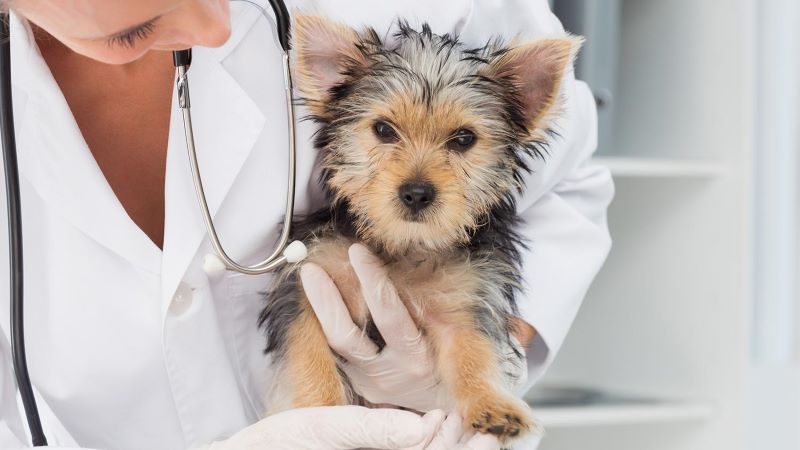Since they welcomed their sweet golden retriever in July, my parents have spent a good amount of time sitting in the exam room at the vet, wondering what new ailment is plaguing their puppy. Turns out there are some illnesses that are fairly common in puppies since their immune systems are not fully developed. Pet insurance can be a great way to protect yourself against the costs incurred by frequent vet visits to treat puppy illnesses. Let’s take a look at some common illnesses young dogs may face in their first few years.
Gastroenteritis
Check! My parents have dealt with two bouts of this one. It turns out that when a puppy roots around in the yard, sniffing and often eating anything and everything, there’s a good chance he might end up with gastroenteritis, an inflammation of the gastrointestinal tract (the stomach and intestines). This illness can be caused by infection with bacteria, virus, parasites, or a reaction to a new food. My parents knew something was up when their puppy refused to eat and began vomiting. Other symptoms are diarrhea, lethargy, and dehydration. If your pet is showing these symptoms, a visit to the vet and often re-hydration and antibiotics (if the infection is bacterial) will help treat gastroenteritis.
Urinary Tract Infections (UTI)
UTIs are caused by bacteria and will affect 14% of dogs throughout their lifetime. In a house-trained puppy, a UTI is fairly easy to detect. Frequent potty accidents, bloody or cloudy urine, and licking their genital area are red flags that your puppy may have a UTI. If your puppy is still working on potty-training, it may be a little harder to recognize the signs, so it is important to keep an eye out and to do what you can to prevent the development of a UTI. Encourage your puppy to drink plenty of water and take him out to go potty frequently. Keeping him well-groomed around his genitals can also help keep infection at bay.
Allergies in Puppies
The three most frequent allergies affecting puppies are environmental, flea, and food allergies.
Environmental
Our sweet puppy has battled environmental allergies since we adopted her two years ago. She is constantly licking and biting her paws. We make sure to bathe her often and to wipe her paws when she comes in from the yard, to keep her from itching. Dust, mold spores, and grass are environmental allergens that may result in recurrent hot spots, runny eyes, and itchy skin. These types of allergies are usually seasonal, but if they are too severe, your vet may recommend medication.
Fleas
As far as fleas go, the saliva in a flea bite can leave a puppy’s skin red and inflamed. If you suspect your puppy has fleas, you can use a flea comb dipped in a mixture of dish soap and water to kill any remaining fleas on the comb. You can also bathe him in a specially formulated flea shampoo. Prevention is key when it comes to fleas, and PetPartners offers a wellness plans that will reimburse pet owners for flea and tick preventative treatments.
Food Allergies
Food allergies may be the toughest to tackle. Puppies who are allergic to something they ate may be extra itchy, experience facial swelling, develop ear infections or have vomiting and diarrhea. A visit to the vet, allergy testing and an elimination diet are recommended when food allergies are suspected.
The Importance of Wellness Care
While you can’t prevent your puppy from contracting common illnesses, you can take various preventative measures to ensure he has the best chance of fighting off infection. Making and keeping regular wellness vet appointments and feeding him a quality diet is super important throughout his lifetime, but especially when he is young. When it comes to feeding your puppy a healthy, balanced diet, Dr. Jim Dobies, a veterinarian with South Point Pet Hospital in Charlotte, N.C., says “If you do, you’re giving your puppy’s immune system the best chance to fight off infection. He is in better shape to fight off illness and recover.”
Let Pet Insurance Help
Pet insurance can help you afford veterinary care for your puppy that can assist in preventing common illnesses as well as treat any illnesses that may still manage to catch up with your pup. Learn more about your pet insurance options and get a quote today!

